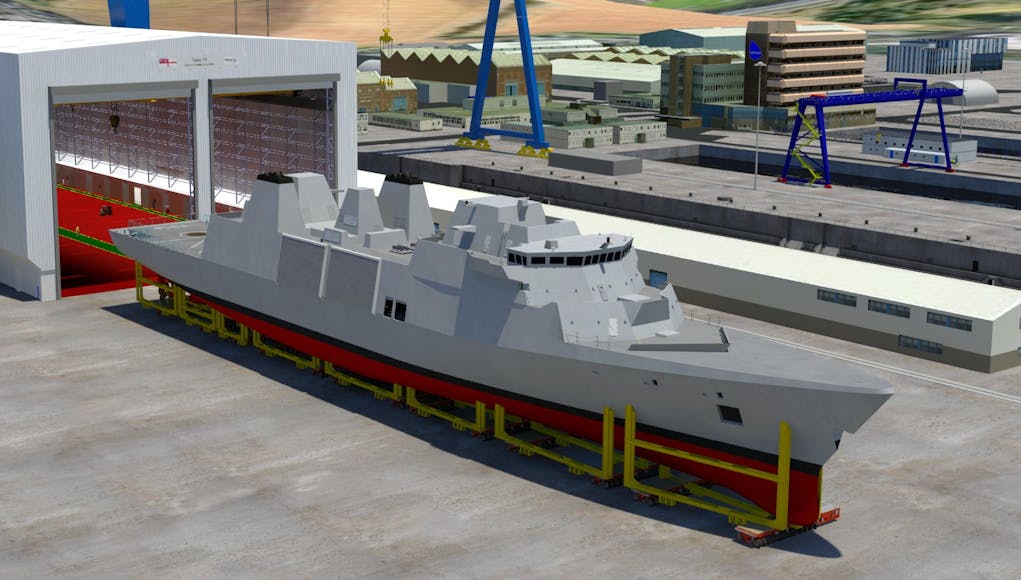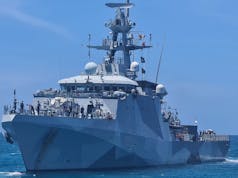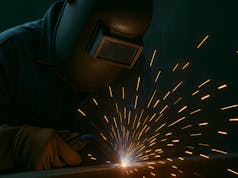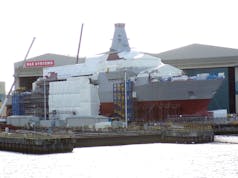Union Prospect calls for a reformed system prioritising UK jobs and economy, in light of continued project failures and wasted taxpayer funds.
On 24 April, union Prospect unveiled its latest report, “Design, Build and Maintain: Effective Defence Procurement,” which advocates for sweeping reform in the UK’s defence procurement process.
The report was launched at an event hosted by MakeUK, featuring a panel of distinguished industry figures chaired by Prospect Senior Deputy General Secretary Sue Ferns.
The panel discussion included insights from Chris Evans MP, Shadow Minister for Defence Procurement; David Watson, the report’s author and independent policy consultant; Andrew Kinniburgh, Director General for Defence at MakeUK; and Bob King, Prospect National Secretary for Defence.
The report outlines a new set of rules to prioritise “the promotion and protection of sovereign capability in UK defence” and highlights the importance of UK design, build, maintenance, and repair for defence equipment.
Sue Ferns emphasised the timeliness of the report, given the upcoming release of a defence command paper in June. Recent reports from the Public Accounts Committee exposed the broken defence procurement system and the failure of the government’s social value rules to sufficiently protect the UK defence industry.
Keynote speaker Chris Evans MP underscored the social value of defence for local communities and the negative impact of a faltering procurement process on the armed forces. Since 2010, £15 billion of taxpayer money has been spent on unsuccessful defence procurement plans, with £5 billion wasted since 2019. Furthermore, 42 out of 45 projects are not on time or budget, ultimately failing the UK’s troops.
Bob King, from Prospect, highlighted the importance of the UK government’s sustained focus on improving defence and investing in the necessary skills and resources. The report compares defence spending overseas, revealing that the UK does far less to boost its own defence industry when awarding contracts than other countries.
The event provided a platform for experts to offer both political and industry perspectives on the sector’s current challenges, with a consensus on the need for reform in defence procurement to restore trust and respect within the industry.
Sue Ferns, Senior Deputy General Secretary of Prospect, concluded: “We need a complete overhaul of the system so we can put UK jobs and the economy at the heart of the bidding process. Only by changing the way we do things will we secure sovereign capacity and support the defence jobs of the future.”














Shouldn’t all of this been done ages ago?! Also late. Get it together people! Stop wasting billions of UK taxpayers money!!!
Over ambitious bidding affects many projects. The result is not so much ‘delay’ as reality. Other causes are fiddling after the design should have been frozen. Sub Brief’s recent video on U.S. maintenance and availability is pointing clearly to a fact about most if not all modern systems: When they fail and need fixing the complexity is now beyond the capacity of militaries to address swiftly. At a time when the headless chickens are running amok over AI, is it not time to reflect? The human being is the most intelligent life form on the planet and simplicity works. The most advanced militaries in history have all been defeated in my life time by not much more than determination. The oldest surviving life forms have one thing in common, simplicity – they answer the greatest of all questions, survival.
Mind you Nature determines in the overwhelming number of cases limited intelligence ( just enough no more) is preferable to the sort of overt intelligence that led to us. Far from being a linear progression to increased intelligence in a given species we were predominantly an accident. Overwhelmingly we would have become extinct before our level of intelligence developed to give us an advantage, in the prey/preyed upon dynamic and could be passed on to create a species that Nature would never deem advantageous overall as it destroys balance and becomes far too energy intensive just to sustain that ‘unneeded’ brain power. So year maybe as a result we over complicate things by our own nature. 🤯.
I know it’s old procurement news but I’m still wondering how a recouperation problem with the Type 45’s wasn’t picked up until all of the ships of the class had been built.
Why didn’t we get the first one built and then test it before okaying the building the rest of the class ?
Were we so last-minute in the Type 42 replacement that we didn’t have time to do it, if so then that mindset should change.
Money.
T42 where haemorrhaging the maintenance budget
T45 would have had build penalties if building was stopped
T45 Manpower pipeline was in full flow with training.
Get T45 built and in the water, after that its a different budget for repairs.
Testing could have taken 18 +Months more money for T42, T45 Build stalled, Training on hold for 18 m.
Simply not feasible.
Wasn’t the T-45 problem predicted beforehand but the cheaper solution for power/propulsion was selected as alternative ‘experts’ claimed it would be good enough. So risks were taken, not enough redundancy built in and we copped the result of that ‘cost saving’ as per usual.
Risk are taken in every program. If you did not take a risk you would never build it.
Because to build a fleet of ships or anything you need to order all the parts in advance otherwise the manufacturers won’t be making the bits you need after you have tested your prototype then you will go right back to the drawing board again after wasting billions.
Modern weapons systems are hideously complicated involving so many parts and it’s very easy for a manufacturer to go bust or simply stop making a component of a component of a component without anyone even realising.
T45 was a world pioneer in electrical power and distribution so much so that data was shared with the US on the Zumwalt.
Much the same with any world first there are risks.
they were warned by a defence supplier…early in the game.
Didn’t test to save money ,which hopfuly there learn from has cost them nothing but money end result 💰💰💰
Not much will of been learned. The Budgets work year on year mostly. So everything will be done to balance the years budget even if it means future year costs will be much higher.
Go back to the early 1960s & RN getting Polaris. One good RN captain in charge from beginning to service introduction. No chopping & changing every five minutes.
It also helped that the DNC drafted in Sir Roland Baker RCNC to oversee the design and construction of Polaris. It would be fair to say he was an absolute Powerhouse and an engineering genius, his Biography is pretty interesting.
Horse bolted years ago. BaE and others were allowed to buy out excellent small British companies, Alvis and Vickers spring to mind. Westland went to the wall. So what are we left with? No choice but to follow Uncle Sam’s MIC with all it’s restrictions and limitations due to their protective policies ( think F35 for one ) . Now? We should source wherever the US does not have influence. Homegrown if we can of course. Imagine a proper carrier with a catapult for one, then look at the choices that were available in European aircraft with some mods. Finally, good old Ajax, procurement at its British best 🙄
The problem is, small businesses don’t have the resources, people, cash reserves, skills and advanced tools needed to design and develop the most complex and cutting edge system, then mature and mass manufacture them. One wrong move and they’re commercially dead.
This is only made worse by the relatively tight margins British industry operates on compared to overseas competitors. There just isn’t the cash needed to invest and operate the business for the long term.
Consider a project needed to introduce automation on to a product line and integrate all the sensors, cyber security and control software. Its millions upfront and success isn’t guaranteed. Or you can hire three or four employees, £120k per year, risk it won’t succeed is low and the immediate hit to cash reserves is minimal. UK PLC consistently adopts the latter because the former’s risk is high, implementation is hard, our people aren’t trained highly enough and cash impact puts the business at risk. But this is one key reason why UK productivity is falling and we are all poorer. Its why our products relative to competitors are more expensive and why we gradually lose market share.
Only bigger firms have the clout needed to drive productivity and survive if it goes wrong.
You never visited Vickers then.
Mind you the catapult option was a problem due to timing a steam catapult would have been a bad design decision but an EMALs would unfortunately equally have been a disaster due to its development issues. The French will be utilising US tech in that regard whenever their new carrier arrives so as I say we were in a No Win situation through timing and the present situation is the best compromise. If it is deemed a catapult is a good decision later the space to do so is there but I doubt it will ever happen.
But otherwise I agree, I remember Racal an incredibly successful Company came from nothing, won numerous Queens award to Industry, created Vodaphone as a sideline because it had vision. But because it’s serious early growth slowed due to its eventual size for the most part, the City and through that the shareholders, demanded it be split up and sold off and thus a new dynamic Company disappeared from History and it’s potential lost. But they were not the only to suffer such fate, though probably the most depressing story. But it’s a long British tradition, for if it’s not ‘grow to sell off’ like RACAL its institutionalised and Business entities working together to sabotage rivals, especially those deemed as upstarts. Even pre and during the War Vickers the Govt darling got preference over new more innovative upstarts like Westland’s and many had to surrender to those ‘big boys’ to survive or flourish at all.
Happened to individuals too off course. We all know how Whittle (the outsider) was treated, but till seeing a documentary last week with interviews with him just prior to his death, I din’t I realise just how badly he was neglected and then treated esp. by Rover who refused to listen to him and later RR who told him that they intended to destroy his Company. This man in 1938 even in the midst of official neglect on his present work, actually patented the hi bypass turbojet engine ie the very engine that dominates jet engine design all these years later. Yet upon RR and others enforcing the demise of PowerJets post war because they didn’t like its ownership structure, even though all their jet tech was freely given to these greedy competitors, Whittle himself barely 40, never, as a result worked on a jet engine design or project again. what a waste of talent and what an industrial clusterf- -k of an economic choice that was, just reminds me of much that has happened since however. But if your face doesn’t fit, be it Company or individual, that’s still so often your fate, The final insult to him happened to the Miles record attempt aircraft for which Whittle designed the engine, when it was cancelled, allegedly at the behest of the US. Yep some things don’t seem to change sadly.
As an aside and I had never heard this before, Whittle himself claimed that (before pissing off to the US in disgust) as an advisor to De Havilland he told them that the Comet’s square windows were not a good idea, but they ignored him. Yes these stories do all sound very familiar sadly.
France, Sweden and Italy are good examples on our doorstep of countries that seem to get great capability out of their similar or smaller defence budgets.
Perhaps that suggests that nurturing domestic industry, providing clear development paths and sustained investment rather than 1. picking bits off the shelf from the US or 2. taking foreign designs and then gold plating them to get something that exactly matches the UK’s niche requirements would be a better approach!
The UK can still produce good stuff occasionally. Missile tech (Brimstone, CAMM, Meteor to name a few) is world leading and generates decent exports.
Spot on we destroyed our industry by the policy of individual orders with no follow on potential just hope that it will lead to new orders meaning limited re investment, fears about Defence Review cuts and most laughably the better the product, and thus long lasting the more likely you will go out of business waiting to produce its replacement. As I mentioned yesterday much of our industry was lost due to this but in the Military sector it’s been unforgivable as it’s so reliant on MoD orders and has been so dictated by MoD requirements that it’s products have limited foreign sales appeal. Talk about short term, short sighted, self sacrificing policies.
Yep! Families of munitions, vehicles, weapon systems etc with spiralled development, simplified logistic/training pipelines as well as an MoD that doesn’t insist on 100% solutions at the expense of numbers, flexibility/utility and the export market.
Long-term planning that isn’t upended by a defence review that hacks and slashes every 5 years.
Problem is this approach takes commitment and long-term investment and the fruits of this approach would take a decade or more to be realised…….so no politician or bean counter is interested!!!
French forces could not even deploy to Mali without ours and the US help. French Airforce is very dated.
Italy has virtually no availability of its forces and Sweden has a home defence force.
Their are trade offs for anyone, is defence spending a jobs procurement process or do you want to give your soldiers the best systems available based on the budget you can afford.
For us that probably means it’s fine procuring US weapons for small fleets like MPA with limited export potential while devoting resources to programs like Tempest that can secure large orders for export and benefit UK defence.
We can save a lot by investing in core programs that can sustain continuous builds like frigates, SSN’s and fighter jets while looking to potential foreign purchase for systems like Self Propelled artillery or guided artillery.
Making our own armoured vehicles is a no brainer, we easily buy enough to keep a continuous build in atleast one factory. We should do this just like we do with warships and fighters.
Completely agree that in a globalised world the days of doing absolutely everything ourselves is long-gone, and in some cases it’s smarter to tap American programs, but Poseidon, Apache, Protector, F35, Joint Rivet, Wedgetail Chinook, C17…….. cumulatively it’s a lot!
Especially as they rarely buy from us.
Jim, no use making comments based on actual knowledge, people don’t want to know. There is this emotional belief that everyone else does it better, never mind that this is only a reality in an alternate universe. Many of the commentators are too lazy to research other countries militaries never mind reading their blogs or national audit reports. Most people who dis the MOD would be shocked to read about the waste in US, French or Italian military projects.
No procurement system is perfect, but would you say France gets less bang for it’s buck out of it’s defence budget than The UK?
Their air force has some obvious gaps (the lack of Chinook’s that hampered them in Mali which Jim alluded to) but combined with the French Navy they will field over 200 modern fast-jets, are procuring 50 A400m whilst retaining a fleet of C-130’s and fielding comparable AEW, tanker and UAV fleets to the RAF.
Their navy will on long-term plans have slightly fewer high-end frigates and destroyers and glaringly only 1 carrier but on the flip side comparable SSN & amphibious fleets and a much larger range of patrol, mine-hunter and survey vessels.
Additionally their army has many more personnel, some really modern equipment and clear plans to modernise in other areas. It know’s what it’s about, what it wants to achieve and how it should be organised to reflect this.
Italy sent 4 A-129 Mangusta and 4 Transport Helicopters for Operation Takhuba and 40 vehicles.
The Swedish Army is 6,000 men, and the armed forces in total are 24,000….
Not sure that’s a model to emulate.
With Sweden I meant emulating their support of home-grown tech rather than numbers or breadth of capability.
I don’t get where you got that but it is way wrong. They even started conscription in 2017…
Conscription doesn’t mean large army, it entirely depends on how many people you conscript. So no, that’s not a valid point to raise.
I notice that you don’t post your own numbers so I could just ignore you, but I’ll entertain your confusion:
As it stands the only mass the Swedish Armed Forces have is the paramilitary Home Guard, which is not an active or deploy-able service (you think the UK has too much light infantry?). Even then the Home Guard is only about 20,000. I’ll throw you a bone and count them in: Even with the Home Guard, even with the Reserves, even counting the Navy and the Airforce: The Swedish Armed Forces are still considerably smaller than the Regular British Army.
It’s not a model we should want to emulate.
As a member of various Engineering & Management Unions over 4 decades I can honestly say the best, most professional, realistic and non political Union I was ever in was Prospect by a mile.
It doesn’t surprise me they came up with this report. I just hope someone reads it.
Having had a quick read of the report, my impression is that, although “worthy” the report doesn’t really add anything to defence procurement knowledge. A logical report should address, where we have been, where we are and where we want to get to. There is no in depth analysis of either our mistakes or successes, either in isolation or in comparison to other G7 countries. Without actual comparative analysis to illustrate where we are, this type of analysis is pretty useless to make suggestions as to where we want to get to.
For me the elephant in the room is to whom has all that wasted money gone to? The cynic in me suspects HMG has been allowing its backers to milk the taxpayer, hence why the situation has been allowed to festure so long & deteriorate.
We can only hope & watch carefully to see if this will remidy the terrible situation with many MOD projects.